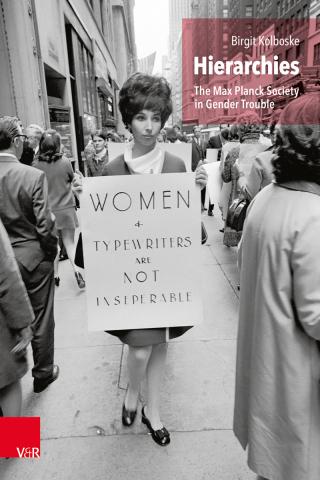
Photo by: Gesine Born
Following a degree in Latin American studies and linguistics at the Freie Universität Berlin, Birgit worked for many years as a journalist, translator, and editor in Mexico and New York. From 2014 to 2022, she was a research scholar of the Research Program on the History of the Max Planck Society (GMPG), whose preparatory phase she coordinated. In 2022, she received her PhD with a thesis on the history of women in the Max Planck Society from the University of Leipzig. In the same year, her book Hierarchien: Das Unbehagen der Geschlechter mit dem Harnack-Prinzip: Frauen in der Max-Planck-Gesellschaft was published open access. In 2025, she joined the Department on Knowledge Systems and Collective Life (Benson) at the MPIWG.
In her current research project, Apocalypse Frau? Feminism, Foetuses and “Fake News”, Birgit explores such fundamental questions as what is the rationale, or rather, motivation for such an extremely retrogressive development that finds its expression in reactionary images of women, misogyny, and the blatant curtailment of women’s rights that is appearing globally at the beginning of the twenty-first century? How is such a relapse into times believed to be long gone to be assessed? How can it be explained that the insights of the Enlightenment – both cultural-historical (Kant) and sexual (Kinsey) – are ignored and replaced by “matters of faith”? What is the historical role of media in the dissemination of ideological thought?
In Christian religious history, apocalypse stands for revelation: the unveiling of divine knowledge in the form of a judgement of God, the end of the world. The Apocalyptic Woman has her origins in the Revelation of John. An early Christian symbol for the Church, she was not identified with Mary until later. Unlike the soulful depictions by Dürer and Rubens (Immaculata) in the Renaissance, for example, the Apocalyptic Woman in the New Testament cries out in pain as she gives birth. In view of the current trend toward the subjugation of women and the politicization of their bodies, the image of the woman in pain proves frighteningly virulent. According to the dictionary, apocalypse, in addition to prophecies dealing with the coming end of the world, also means: “doom; disaster; horror.” From a feminist point of view, the apocalypse seems to be already underway.

Media
Selected Publications
Kolboske, Birgit (2024). Hierarchies: The Max Planck Society in Gender Trouble. Studien zur Geschichte der Max-Planck-Gesellschaft 7. Göttingen: Vandenhoeck & Ruprecht. https://www.vandenhoeck-ruprecht-verlage.com/detail/index/sArticle/59083…
Read More
Kolboske, Birgit (2024). “Jerarquía, género y ciencia: científicas y secretarías en el Instituto Max Planck.” In Constelaciones feministas para habitar el mundo: miradas entrecruzadas y destellos de luz para un presente herido, ed. G. Rovira Sancho,…
Read More
Sousa Buarque, Bernardo, Mona Friedrich, Birgit Kolboske, Jürgen Renn, Matthias Schemmel, Juliane Scholz, Alexander von Schwerin, Sascha Topp, and Malte Vogl (2024). “Dimensionen wissenschaftlichen Arbeitens.” In Die Max-Planck-Gesellschaft:…
Read More
Kolboske, Birgit and Juliane Scholz (2024). “Personalstruktur im Wandel.” In Die Max-Planck-Gesellschaft: Wissenschafts- und Zeitgeschichte 1945–2005, ed. J. Renn, C. Reinhardt, J. Kocka, F. Schmaltz, B. Kolboske, J. Balcar, and A. von Schwerin, 550…
Read More
Past Events
Workshop
- Institute Event
[RESCHEDULED] Workshop: "BIPoC, birthing bodies, fauxminism—und wie sage ich das auf Deutsch?"
MORELecture
- Institute Event
Miriam Stein: Die gereizte Frau. Was unsere Gesellschaft mit meinen Wechseljahren zu tun hat
MOREWorkshop
- Institute Event
Workshop: "Missing Pictures"
MOREColloquium
Hierarchies. The Max Planck Society in Gender Trouble
MOREBook Launch
- Institute Event
Fundamental Questions: Gender Dimensions in Max Planck Research Projects
MORESymposium
Fünfzig Jahre später – fünfzig Jahre weiter?
MOREInstitute's Colloquium
Equal Opportunities in the Max Planck Society: Education, Human Development and Gender Issues
MORE

